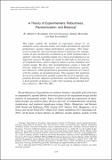A Theory of Experimenters: Robustness, Randomization, and Balance
Author(s)
Banerjee, Abhijit V.; Chassang, Sylvain; Montero, Sergio; Snowberg, Erik
DownloadPublished version (695.9Kb)
Publisher Policy
Publisher Policy
Article is made available in accordance with the publisher's policy and may be subject to US copyright law. Please refer to the publisher's site for terms of use.
Terms of use
Metadata
Show full item recordAbstract
© 2020 American Economic Association. All rights reserved. This paper studies the problem of experiment design by an ambiguity-averse decision-maker who trades off subjective expected performance against robust performance guarantees. This framework accounts for real-world experimenters’ preference for randomization. It also clarifies the circumstances in which randomization is optimal: when the available sample size is large and robustness is an important concern. We apply our model to shed light on the practice of rerandomization, used to improve balance across treatment and control groups. We show that rerandomization creates a trade-off between subjective performance and robust performance guarantees. However, robust performance guarantees diminish very slowly with the number of rerandomizations. This suggests that moderate levels of rerandomization usefully expand the set of acceptable compromises between subjective performance and robustness. Targeting a fixed quantile of balance is safer than targeting an absolute balance objective.
Date issued
2020Department
Massachusetts Institute of Technology. Department of EconomicsJournal
American Economic Review
Publisher
American Economic Association